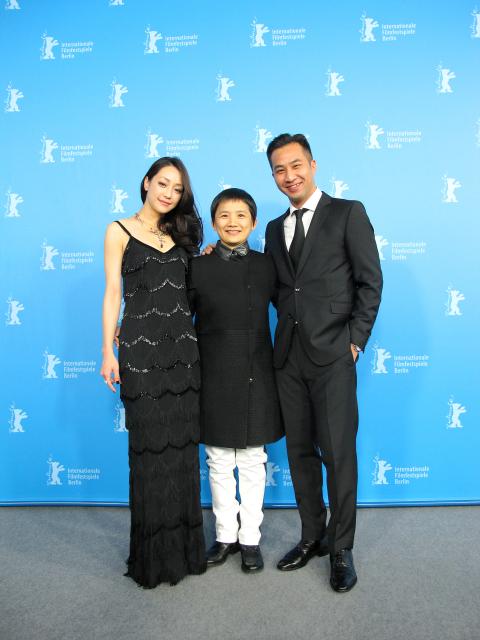Occupying a small corner of the recently refurbished Martin Gropius Bau art gallery in central Berlin, also the temporary headquarters for the city’s 64th Berlin film festival, a team of Taiwanese film industry heavy-weights and sales agents were busily engaging a stream of visitors.
The nine-strong group had a mission on their hands: to sell the political docu-drama and festival selected-film The Rice Bomber (白米炸彈客) to the world.
“I just hope that audiences in Berlin can see something different about Taiwan,” explained the film’s director Cho Li (卓立).

Photo courtesy of 1 Production Film Co / Ocean Deep Films
The Rice Bomber is certainly different. Based on the life of self-confessed bomb-maker Yang Ju-men (楊儒門) the two-hour film carefully unpicks the events leading up to his politically-motivated 12-month campaign of 2003-2004 during which he planted 17 small bombs, packed with rice, to highlight the hardships faced by struggling Taiwanese farmers.
After Taiwan joined the WTO to much pomp and ceremony in early 2002, Taiwanese farmers were then forced to compete in an increasingly competitive agricultural market. It was from this anxious and uncertain period that Yang emerged and seared his mark on Taiwanese history. While his bombs, the first of which bore the message: “Against rice importing — the government should look after its people,” never killed or injured anyone (in fact only two detonated), he was sentenced to seven-and-a-half years in jail in 2005. He was pardoned in 2007 after spending 16 months in jail.
“The Rice Bomber is the first film about the agricultural industry in Taiwan,” says Cho Li, her tiny frame dwarfed by the palatial and opulent hall of the once war-ravaged Martin Gropius Bau interior.

Photo: Taipei Times
“I am from Changhua, the same city as the rice bomber, and that’s one of the reasons I wanted to make this film. He planted those bombs in 2003-2004, but he had seen farmer’s hardship for more than 20 years by then,” she says.
For lead actor Jag Huang (黃健瑋), who also attended the festival, playing the man who has become part of modern-day Taiwanese folklore had its own challenges, many of them physical.
“Yang had been in an elite unit of the Taiwanese army and so he was strong,” says Huang, “and that meant I had to get into shape for the role … at one point I cycled all the way around Taiwan.”
Huang says he felt sympathy with Yang, whom he met in person, for the task.
“He didn’t use nails or anything, it wasn’t really violent. I think it was more like an announcement to create awareness.”
The film is, at times, a somewhat overly sentimental portrayal of Yang, with music designed to pluck at our heartstrings, and a cast of victimized characters, which robs the film of some of its political punch.
However, it is a brave attempt to tackle a controversial issue and the film cleverly uses newsreel footage and dialogues between Yang and his alter-ego to provide both context and insight. Taiwan also plays a leading role with High Definition film portraying Taipei, Changhua and coastal areas in a beautiful light.
The film ventures into further controversial territory with the portrayal of ‘trouble-maker,’ the young woman who became Yang’s friend and confidante. Despite rumors that ‘trouble-maker,’ played by Nikki Hsieh (謝欣穎), was the daughter of a wealthy and influential family, she espoused revolutionary theories and ideas that, as is shown in the film, she uses to both goad, inspire and dismiss Yang.
For Hsieh the role she played required plenty of personal innovation.
“I was aware that the character was based on someone real — she was tough but attractive and also confident. I had to find that in myself,” she said.
For Hsieh, recently seen in the films Make Up (命運化妝師) and Honey Pupu (消失打看), the film fulfills another role, which is to lift Taiwanese movies into new territory.
“We’ve had a lot of commercial films but this allows Taiwanese to see the problems society is facing.”
Tapping into the realities of Taiwan remain a source of inspiration for the film’s producers Yeh Ju-fen (葉如芬) and Lee Lieh (李烈) who helped steer the kitchen-based comedy Zone Pro Site (總舖師) to commercial success.
“Although Taiwan is a very small country, people there are full of life,” Yeh says, adding, “this is more and more apparent in our movies. Though Taiwanese film-makers may be young, they are creatively vibrant and that’s why the Taiwanese film industry is booming.”
After Yang received a presidential pardon in June 2007, he has turned his attention to promoting organic farming and locally-based farmers’ markets.
Actor Huang, having just watched the premiere in Berlin explained: “I was nervous about it all, but now I think I can see Yang again and say, ‘it was an accurate portrayal — I didn’t let you down.’”

In the March 9 edition of the Taipei Times a piece by Ninon Godefroy ran with the headine “The quiet, gentle rhythm of Taiwan.” It started with the line “Taiwan is a small, humble place. There is no Eiffel Tower, no pyramids — no singular attraction that draws the world’s attention.” I laughed out loud at that. This was out of no disrespect for the author or the piece, which made some interesting analogies and good points about how both Din Tai Fung’s and Taiwan Semiconductor Manufacturing Co’s (TSMC, 台積電) meticulous attention to detail and quality are not quite up to

April 21 to April 27 Hsieh Er’s (謝娥) political fortunes were rising fast after she got out of jail and joined the Chinese Nationalist Party (KMT) in December 1945. Not only did she hold key positions in various committees, she was elected the only woman on the Taipei City Council and headed to Nanjing in 1946 as the sole Taiwanese female representative to the National Constituent Assembly. With the support of first lady Soong May-ling (宋美齡), she started the Taipei Women’s Association and Taiwan Provincial Women’s Association, where she

Chinese Nationalist Party (KMT) Chairman Eric Chu (朱立倫) hatched a bold plan to charge forward and seize the initiative when he held a protest in front of the Taipei City Prosecutors’ Office. Though risky, because illegal, its success would help tackle at least six problems facing both himself and the KMT. What he did not see coming was Taipei Mayor Chiang Wan-an (將萬安) tripping him up out of the gate. In spite of Chu being the most consequential and successful KMT chairman since the early 2010s — arguably saving the party from financial ruin and restoring its electoral viability —

It is one of the more remarkable facts of Taiwan history that it was never occupied or claimed by any of the numerous kingdoms of southern China — Han or otherwise — that lay just across the water from it. None of their brilliant ministers ever discovered that Taiwan was a “core interest” of the state whose annexation was “inevitable.” As Paul Kua notes in an excellent monograph laying out how the Portuguese gave Taiwan the name “Formosa,” the first Europeans to express an interest in occupying Taiwan were the Spanish. Tonio Andrade in his seminal work, How Taiwan Became Chinese,